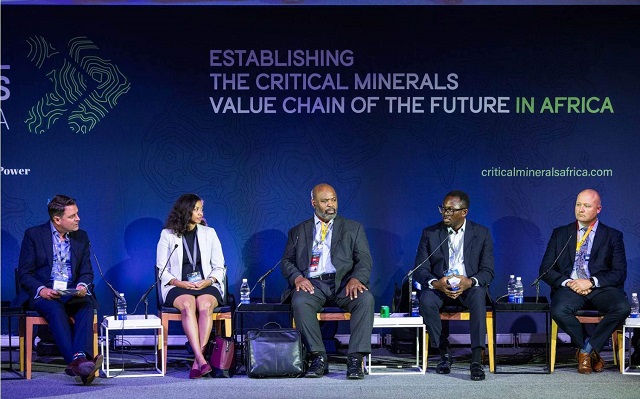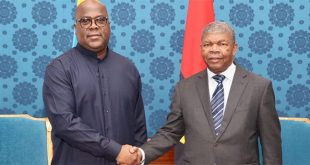
We are not interested in selling raw material, say delegates
Cape Town, South Africa | THE INDEPENDENT | A high-level panel at Critical Minerals Africa Summit 2023 has identified key factors shaping the future critical minerals market and how Africa can position itself as a global hub.
The Critical Minerals Africa summit, the first of its kind, was organised by Energy Capital & Power which is billed as the continent’s leading investment platform for the energy sector.
Critical minerals include copper, lithium, nickel, cobalt, manganese, graphite, and rare earth elements that are essential components to development of clean energy technologies such as Solar PV, wind turbines, electric vehicles. Demand for these minerals is growing quickly as clean energy transitions gather pace
The panel on Oct.18 discussed how sustainable practices, localised supply chains and integrated mining operations will help secure critical minerals supplies of the future.
Moderated by Olimpia Pilch, Founder and COO of Critical Minerals International Alliance, the panel featured Kwasi Ampofo; Head of Metals and Mining, BloombergNEF, Alex Benkenstein; Head of the Climate and Natural Resources Programme, South African Institute of International Affairs (SAIIA), Dr. Marit Y. Kitaw; Interim Director, African Minerals Development Center (AMDC), Deshan Naido; Managing Director, AQORA, and Duma Sisulu; Co-Founder & Chief Analyst, Parime Battery Minerals.
The panel sought to explore the future of Africa’s minerals economy in light of growing demand for clean energy technologies and mounting pressure to decarbonise existing mining activities and maximize resource efficiency.
Speaking to the scope of demand growth for energy transition mineral and metals, Kwasi Ampofo noted: “We currently use 50 million metric tonnes of metals going into transition technologies and accompanying infrastructure. By 2050, if we reach the scenario based on current policies and economics, we will need about 140 million metric tonnes. If we reach the net-zero scenario, this goes up to 250 million metric tonnes.”
In evaluating the strength of Africa’s currently local and regional supply chains, panelists evaluated strategies that can be implemented to ensure their resilience and build more localised value chains, which can help achieve market stability.
“There’s a lot of discussion around demand, but we don’t see the same enthusiasm around funding supply. There is a shortfall in supply, which then spikes demand. Every time the price drops for example, in nickel, there will be producers who are unable to match the current supply at that price. We will then have a continuation of these supercycles, which is not sustainable,” commented Duma Sisulu.
“If the critical minerals supply chain doesn’t change, then we have failed as Africans. We have the opportunity to do what the international oil giants did 50-60 years ago. We have the bargaining power for the deposits that sit on the continent,” said Deshan Naido.
According to the panel, the future of Africa’s critical minerals will involve mining companies diversifying their operations across multiple sectors, while fostering synergy among mining and energy sectors, owing to Africa’s acute energy deficit. Establishing value-added activities will also be essential to maximising resource efficiency and ensuring the sustainability of the extractive sector.
“Africa does not have to accept its position within global supply chains… Mineral processing is energy intensive and requires a steady supply. This is not an absolute barrier – it can be rectified – which has been seen by the influx of investment by mining companies in South Africa to invest heavily in renewable energy technologies,” stated Alex Benkenstein.
“The only way to transform lives is to add value, job creation, skills transfer, economies of scale, transformation and growth. This gives us the opportunity to set the agenda we need processing, refining and value addition,” emphasized Dr. Marit Y. Kitaw.
The Critical Minerals Africa 2023 summit is currently took place from Oct. 17-19 and served to position Africa as the primary investment destination for critical minerals. The event was held alongside the African Energy Week 2023 conference that ran from Oct. 16-20. The two events offered delegates access to the full scope of energy, mining and finance leaders in Cape Town.
The main conference agenda of Critical Minerals Africa 2023 officially kicked off with a high-level ministerial forum that addressed the future of African mineral resource development, as African mineral reserves gear up to power a global energy transition.
Ministers from South Sudan and Malawi and ministry representatives from Tanzania and Zimbabwe united to outline transformative visions for their respective critical minerals sectors and efforts to attract foreign partnerships and cement the continent’s geopolitical position as a global minerals hub.
They mostly called for strengthened engagement with foreign partners and investors during the opening of the main conference.
“In the last 10 years, we have been looking at where the world is moving. The energy transition will not be able to move forward without critical minerals,” stated Martin Gama Abucha, Minister of Mines of South Sudan. “We have signed a number of Memoranda of Understanding with Russian and Chinese companies to undertake studies and geological mapping of our mineral reserves. We are also looking for collaboration within Africa.”
“Partnerships are key in ensuring success in this fairly new sector. Specifically, public-private sector partnerships are able to access financing that’s not normally available to governments and are important in ensuring transparency,” noted Leon Godza, Director of Energy Minerals for the Ministry of Mines & Mining Development of Zimbabwe.
Seeking partnerships
Africa’s mining ministers emphasized the urgency in establishing value-added industries to mining activities, with countries including Tanzania, Zimbabwe and the Democratic Republic of the Congo having implemented raw mineral export bans to encourage investment in domestic mineral processing capabilities.
Panelists discussed how local governments can incentivize investment across the entire mining value chain, with a view to stimulating job creation and skills development.
“We are not interested in selling raw material – we are interested in selling finished goods,” underscored Minister Abucha.
“In Kabanga in the northwest of Tanzania, we have found high-grade nickel deposits, but production has not yet started. We are seeking partners with the skills and knowledge to conduct deeper and wider exploration of the minerals we have, focusing strategically on critical minerals. The mineral supply chain could be at risk if we don’t find enough supplies,” said Steven L. Kiruswa, Deputy Minister of Minerals of Tanzania.
Within local value addition and retention, the panel affirmed the need to strengthen regional cooperation and explored how African producers can leverage synergies with neighboring countries to establish mutually beneficial trade and partnerships.
“We are trying to learn as much as possible from our big brothers, who have been in the industry for a long time,” stated Monica Chang’anamuno, Minister of Mining of Malawi. “We need to have one voice – African countries should start approaching critical minerals as a bloc that can allow us to control the opportunity. We would like to partner and build country-to-country agreements with other African countries with the same minerals.”
“Tanzania has a gold refinery and is developing refineries for nickel and graphite. Other African countries can use Tanzania as their gateway for producing, processing and adding value to these minerals,”said Kiruswa. “When you have value addition in place, the multiplier effect is tremendous.”
UK pledges R20 million
The UK will help African countries identify and develop bankable opportunities within their critical minerals value chains, with a view to promoting responsible exploration and development, capturing greater value and effectively managing extractive sector revenues
During the summit, the United Kingdom announced a pledge to help African countries expand their critical mineral supply chains – with a focus on promoting mineral exploration and processing, generating value-added activities and creating local jobs.
“African countries rightly have a high level of ambition for unlocking the value of their natural resources and the UK will work with them in partnership to support delivery of their ambitions,” stated Ambassador Antony Phillipson, British High Commissioner to South Africa. “We are committed to increasing our investment in the continent and strengthening the transparency and resilience of the supply chain for critical minerals – creating green jobs in Africa, while taking action on climate change.”
To be launched next week, the pledge will take the form of an initial R20-million (Approx. US$1 million) contribution and comes on the back of growing cooperation between the UK and Africa in the critical minerals arena.
Last November, South African President Cyril Ramaphosa conducted a state visit to the UK seeking to leverage British capital and technology toward building South Africa’s industrial capacity. The UK already represents the largest international investor in South Africa, which is home to 80% of global platinum group metal reserves, 70% of global manganese reserves, and substantial reserves of vanadium and magnesium.
The UK is also set to host the second edition of its African Investment Summit in London next April, which aims to promote bilateral trade and investment and strengthen UK-African partnerships.
 The Independent Uganda: You get the Truth we Pay the Price
The Independent Uganda: You get the Truth we Pay the Price


